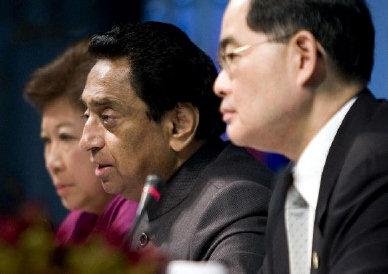India, ASEAN sign deal on free trade in goods
Reuters | Thu Aug 13, 2009
India, ASEAN sign deal on free trade in goods
– India, ASEAN clinch long-delayed trade deal
– Indian states had resisted deal
– Accord does not encompass software, information technology

By Vithoon Amorn
BANGKOK, Aug 13 (Reuters) — India and the 10-country Southeast Asian bloc ASEAN signed a free trade agreement on Thursday after more than six years of negotiations, but the deal did not embrace software and information technology.
Thai and Indian officials said the agreement would eliminate tariffs on products including electronics, chemicals, machinery and textiles that account for more than 80 percent of total trade in goods between the two sides.
The agreement will be effective from Jan. 1, 2010, and tariffs on the products covered would be reduced to zero between 2013 and 2016, according to a joint statement.
The agreement was signed in Bangkok on the sidelines of a meeting of economic ministers of Association of South East Asian Nations — grouping Brunei, Cambodia, Indonesia, Laos, Malaysia, Myanmar, the Philippines, Singapore, Thailand and Vietnam.
"This is a FTA with a regional economic community and we hope that we will be able to take it forward as we have agreed to expedite agreements on investment and services so that it becomes a comprehensive partnership," Indian Commerce and Industry Minister Anand Sharma told reporters after the signing.
"We are committed to elevate our engagement to a higher level. For the figure of $10 billion of our bilateral trade with Thailand by 2010, we are sure to achieve that."
After strong lobbying by India’s farm sector, led by southern Kerala and Karnataka states, the terms of the FTA let India protect its agricultural sector by excluding 489 products, mostly commodities including rubber, from tariff cuts.
Tariffs on a much smaller list of products described as "highly sensitive", including palm oil and coffee, would be reduced over about 10 years, but only modestly.
Kerala state had objected to slashing duties on fish, rubber, palm oil, pepper, tea and coffee.
"Their concerns have been adequately addressed," Sharma said. "Now we can release details of the agreement, including the exclusion list and the highly sensitive list. Now we can do that by making them public as there has been some speculative apprehension."
Indonesia and Malaysia had actively sought Indian tariff cuts on palm oil products, but India insisted on protecting its products from cheaper ASEAN imports, mainly from those countries.
Amit Mitra, secretary-general of the Federation of Indian Chambers of Commerce and Industry, told reporters before the signing: "We came to the conclusion that it will be a win-win for both sides. Our minds have met. Of course, a few will lose, but many more will gain."
He said the ASEAN countries were not yet ready for an FTA encompassing software, information technology and tourism.
"India has the most powerful IT and software industry in the developing world ... It is still not clear when ASEAN can conclude an IT agreement with India. As soon as we sign this today, we will start negotiations on an IT agreement," he added.
ASEAN is India’s fourth-largest trading partner after the European Union, the United States and China. Two-way trade between India and ASEAN was $47 billion in 2008, the statement said. (Editing by Alan Raybould and Ron Popeski)





